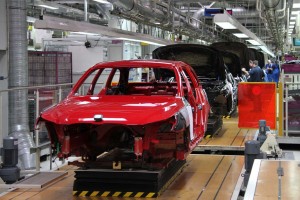Talks between German industrial employers, including major carmakers, and Europe’s largest industrial union, IG Metall, are now at an impasse.
Talks are resuming, but so far five rounds of negotiations have produced little movement and a round of warning strike earlier this month at several companies, including Porsche, BMW and Daimler, suggest that the powerful union is gearing up for a confrontation.
Despite the German economy showing signs of slow growth, the giant German union is pushing for a 6.5% pay increase. In addition, the union negotiators appear to have taken a stand on placing limits on the use of contract workers and subcontractors in auto plants in southern Germany operated by Porsche, Daimler and BMW. Like other carmakers around the world, German manufacturers have used subcontractors to offset high labor costs.
In German auto plants the standard work week is only 35 hours and the industry’s labor costs are now among the highest in the world — which has prompted carmakers to shift more work to North America and Eastern Europe where wages and benefits are typically far lower.
“We still have no enduring solutions in sight in regards to issues of temporary workers and guarantees of permanent contracts for people completing apprenticeships,” IG Metall noted in a statement after the discussion broke off last week.
The employers association, representing the various German automotive manufacturers, has offered the union a 3% pay increase over the next 14 months. That offer has been roundly dismissed.
The negotiations around Stuttgart – home to Mercedes-Benz and Porsche — which usually serves as the template for other agreements in Germany, also could make it difficult for General Motors’ deeply troubled Opel unit to demand concessions from IG Metall.
The GM subsidiary continues to operate deeply in the red and the maker is expected to not only seek givebacks from the union but may also press to close two plants, according to those familiar with a turnaround plan under development.
Meanwhile, Wolfgang Schaeuble, Germany’s finance minister, has suggested in an interview in the German business magazine Focus that German industrial companies, which have benefited from the structural reforms adopted in Germany a decade ago, can afford pay increases.
Complicating matters for the automakers, union leaders have been able to touch on growing public resentment towards the increased pay and benefits German automakers have been offering senior executives in recent years. Traditionally, there was a far smaller gap between what a factory worker and a CEO make in Germany when compared to their American counterparts. That began to change following the failed 1998 “merger of equals” between Daimler and Chrysler. Today, many German automotive executives are taking home salaries and bonuses on a par with U.S. standards.

